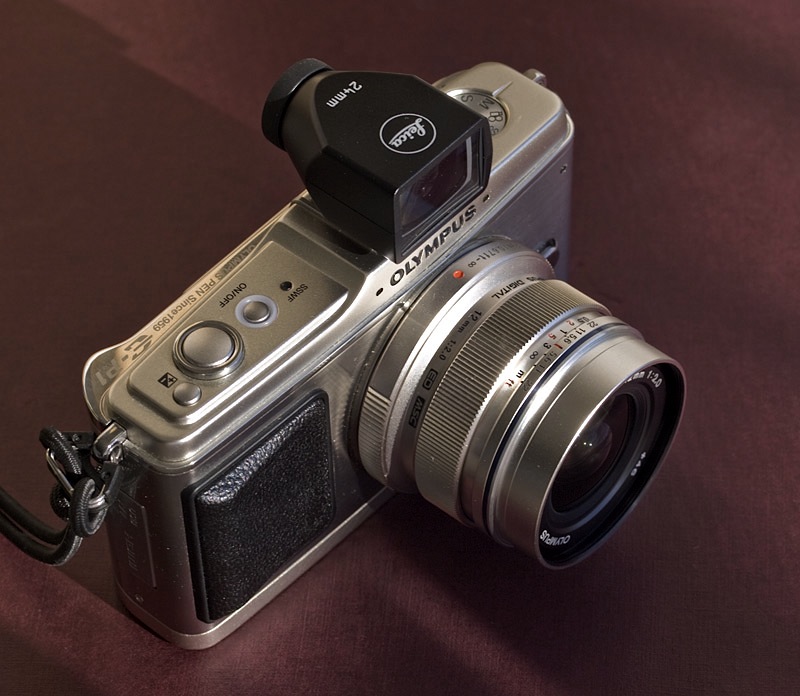Thardy
Veteran
Has anyone tried the Panny 7-14 f/4 zoom? I read somewhere that it is excellent. I like the convenience of a good zoom.
With the X100 being made of unobtanium; not that wide nor great at manual focus, I though I would give µFT another chance.
It's quite nicely made - seems sharp and flare resistent, but not had time to do much more than walk around the block.
All AF lenses should have MF rings like this 😀

The viewfinder is spot on (24mm e135 4:3 aspect for the Dlux-4)
Has anyone tried the Panny 7-14 f/4 zoom? I read somewhere that it is excellent. I like the convenience of a good zoom.
And nobody said anything about m4/3 being cheaper.
Also I think you underestimate how difficult it is to make a 12mm f2 lens...
The hood in that hands on isn't the official Olympus hood - it's a cheap on the dude found on ebay.
It looks like a great lens, but it's big and expensive.

I don't get the point of an $800 lens on a tiny sensor... call me old-fashioned...
I believe that was part of the marketing when Olympus introduced the E1 and the whole 4/3 system gibberish about how cool smaller sensors are. I'll have to check my Pop Photos from the era.
Tell that to Canon. They've been making fast lenses for small cameras since the Canon G1. That was a 7-21mm f/2-2.5 in a camera that barely cost $900 (only because a 3 mp point and shoot cost that much back then). Are you going to tell me making a prime is harder than a zoom? Cosina can make a 12mm rectilinear lens for a full-frame camera and market it at $650 or so, and that's much more of an engineering feat than a small lens for a small sensor. Small lenses are easier/cheaper to make than a big lens. How else could Nikon make an 18-55mm zoom (remember, they're harder to engineer) for a third of the price of a 18mm prime? Because there's less sensor to fill.


Are you sure you'd regard it as big? It looks really small for a fast wide to me... It's smaller then the kit 14-42mm zoom when retracted and locked.
This lens may sell me on the system. An all-metal, small, fast 24mm equivalent lens. If they make more lenses in that style, I'm sold. All I want is a 14mm f/2.0 and a 17mm f/1.8 and I'm in. Maybe an 11mm f/3.5 as well =).
^ Well, fair enough, but there's already the 14mm f2.5 and the 17mm f2.8 that have your wide and small needs covered, so it's not like you don't have choice.
IMO this system has always needed some high quality small primes, especially in the wides, and this is a great start.
I believe that was part of the marketing when Olympus introduced the E1 and the whole 4/3 system gibberish about how cool smaller sensors are. I'll have to check my Pop Photos from the era.
Tell that to Canon.
rangefinderforum.. kind of gives it away 😉
seriously though, it's quite a wide lens, which makes it more a specialty lens than a walkaround.. which may explain the lack of a frenzy here.
I believe that was part of the marketing when Olympus introduced the E1 and the whole 4/3 system gibberish about how cool smaller sensors are. I'll have to check my Pop Photos from the era.
Tell that to Canon. They've been making fast lenses for small cameras since the Canon G1. That was a 7-21mm f/2-2.5 in a camera that barely cost $900 (only because a 3 mp point and shoot cost that much back then). Are you going to tell me making a prime is harder than a zoom? Cosina can make a 12mm rectilinear lens for a full-frame camera and market it at $650 or so, and that's much more of an engineering feat than a small lens for a small sensor. Small lenses are easier/cheaper to make than a big lens. How else could Nikon make an 18-55mm zoom (remember, they're harder to engineer) for a third of the price of a 18mm prime? Because there's less sensor to fill.

